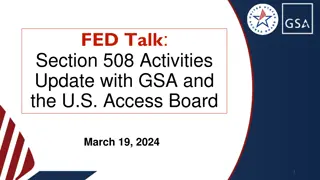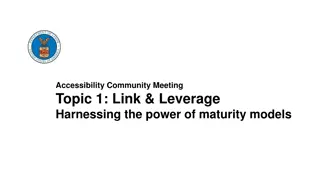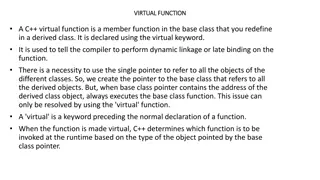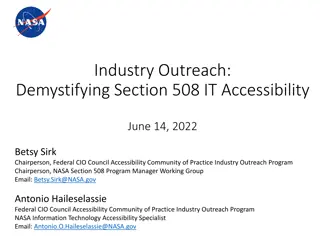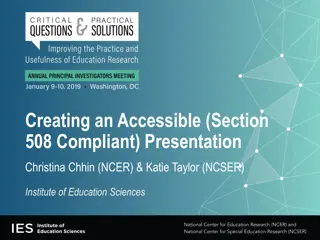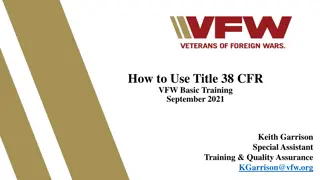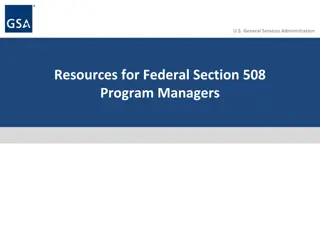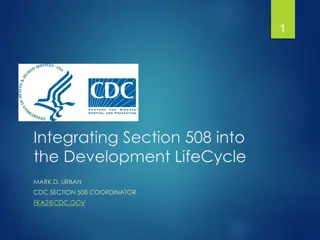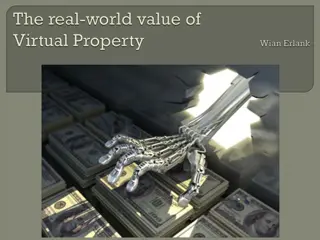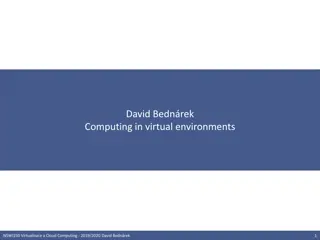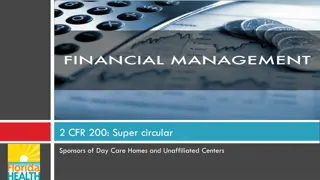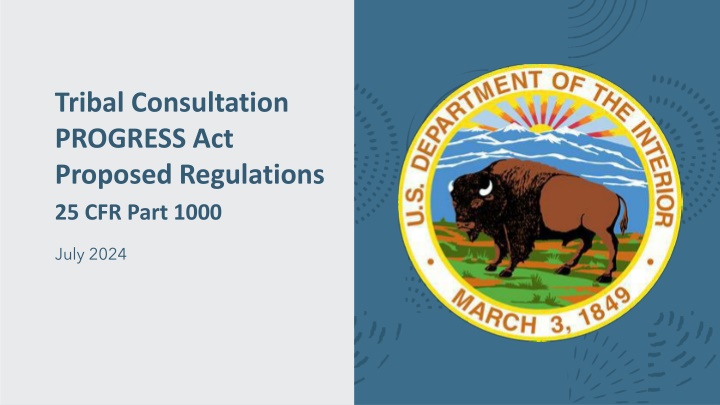
Tribal Consultation Progress Act Proposed Regulations July 2024
Learn about the Tribal Consultation Progress Act Proposed Regulations for July 2024, including topics for consultation, key officials involved, and the negotiated rulemaking process. Discover how the government and tribal leaders engage in discussions to implement annual funding agreements under the Tribal Self-Government Act Amendments, promoting self-governance and self-determination for Indian tribes.
Uploaded on | 0 Views
Download Presentation

Please find below an Image/Link to download the presentation.
The content on the website is provided AS IS for your information and personal use only. It may not be sold, licensed, or shared on other websites without obtaining consent from the author. If you encounter any issues during the download, it is possible that the publisher has removed the file from their server.
You are allowed to download the files provided on this website for personal or commercial use, subject to the condition that they are used lawfully. All files are the property of their respective owners.
The content on the website is provided AS IS for your information and personal use only. It may not be sold, licensed, or shared on other websites without obtaining consent from the author.
E N D
Presentation Transcript
Tribal Consultation PROGRESS Act Proposed Regulations 25 CFR Part 1000 July 2024
Government-to-Government Tribal Consultation Topic for Consultation: Proposed Rule implementing 25 CFR 1000 Annual Funding Agreements Under the Tribal Self-Government Act Amendments to the Indian Self-Determination and Education Act DOI Tribal Consultations are closed to the Public. Press please self-identify. Court reporter will create transcript to ensure we respond to comments. During today s session, we will ask Tribal leaders and elected officials to provide comments. When commenting, please begin with your name and Tribal affiliation for the court reporter.
Tribal Consultation on PROGRESS Act Proposed Rule Department Officials Bryan Newland, Assistant Secretary Indian Affairs Wizipan Garriott, Principal Deputy Assistant Secretary Indian Affairs Kathryn Isom-Clause, Deputy Assistant Secretary Indian Affairs for Policy and Economic Development Sharee Freeman Director for the Office of Self-Governance, DOI Tribal Officials W. Ron Allen, Chairman/CEO, Jamestown S Klallam Tribe Melanie Fourkiller, Director of Self-Governance and Health Policy, Choctaw Nation of Oklahoma Facilitation Team Kearns & West
Process used for Negotiated Rulemaking On October 21, 2020, the Practical Reforms & Other Goals to Reinforce the Effectiveness of Self Governance & Self Determination for Indian Tribes (PROGRESS) Act was signed into law to amend subchapter IV of the Indian Self-Determination and Education Assistance Act (ISDEAA) and the Department s Tribal Self-Governance Program. The PROGRESS Act called for a negotiated rulemaking committee (Committee) to be established, with membership comprised only of representatives of Federal and Tribal governments, and the Director of OSG serving as the lead for the Department.
Process used for Negotiated Rulemaking The Committee met 15 times between August 2022 and April 2024 to negotiate and generate text of the Proposed Rule. Each meeting was open to the public and the public had the opportunity to provide comment. The Committee received no public comments during its meetings.
Self-Governance Negotiated Rulemaking Committee See https://www.bia.gov/sites/default/files/dup/tcinfo/appx_c_membership_appendix_6.28.24_508_1%29.pdf Tribal Members of Self Tribal Members of Self- -Governance Negotiated Rulemaking Committee Governance Negotiated Rulemaking Committee Sandra Sampson, Board Treasurer Confederated Tribes of the Umatilla Indian Reservation W. Ron Allen, Chairman/CEO Jamestown S'Klallam Tribe Melanie Benjamin, Chief Executive Jennifer Webster, Councilwoman Mille Lacs Band of Ojibwe Oneida Nation Central Council of the Tlingit and Haida Indian Tribes of Alaska Gerry Hope, Transportation Director, Former Tribal Leader Richard Peterson, President Sitka Tribe of Alaska The Confederated Salish and Kootenai Tribes of the Flathead Reservation Chippewa Cree Indians of the Rocky Boy's Reservation Michael Dolson, Chairman Jody LaMere, Councilwoman Melanie Fourkiller, Director of Self-Governance Choctaw Nation of Oklahoma Lana Butler, Secretary Sac and Fox Nation Central Council of the Tlingit and Haida Indian Tribes of Alaska Russel (Buster) Attebery, Chairman Will Micklin, Second Vice President Karuk Tribe Karen Fierro, Self-Governance Director Ak-Chin Indian Community Annette Bryan, Council Member Puyallup Tribes of Indians
Major Provisions of the PROGRESS Act and Proposed Rule: The PROGRESS Act s amendments to Title IV include: 25 U.S.C. 5363 Eligibility Will allow more Tribes to join Self Governance, a more relaxed standard regarding Tribal audits. 25 U.S.C. 5364 Compacts are now required. 25 U.S.C. 5363(p) Existing and Subsequent Funding Agreements indefinite agreements are now possible by Tribal option.
Major Provisions of the PROGRESS Act and Proposed Rule: The PROGRESS Act s amendments to Title IV include: 25 U.S.C. 5366 Final Offer (new provision) Secretary has 60 days to act on a Tribal final offer, or may request, if a Tribe agrees additional time. BIA final offer inaction will result in a deemed approved offer. 25 U.S.C. 5365 Final Offer Non-BIA Final offer no action, Secretary is deemed to have rejected the offer for special geographic, historical, or cultural significant programs. 25 U.S.C. 5367 Construction (all new provisions)
Major Provisions of the PROGRESS Act and Proposed Rule: 25 U.S.C. 5368 Investment Standard has changed to "prudent investment standard". 25 U.S.C. 5963(b) Waiver of regulations - 120 days for decision, if no decision, it is deemed approved. For non-BIA it is deemed denied. Amends Title IV to be similar to Indian Health Service (IHS) Title V and allows for administrative efficiencies by enabling Tribes to operate under similar statutory frameworks for self-governance. Tribes requested and the Department agreed to codify the Executive Orders consultation process in the proposed regulation for all matters involving self- governance.
The Committee reached consensus on most of the rule: Subpart A General Provisions Subpart B Selection of Additional Tribes for Participation in Tribal Self- Governance Subpart C Planning and Negotiation Grants for BIA Programs Subpart D Financial Assistance for Planning and Negotiations Activities for Non-BIA Programs Subpart H Negotiation Process Subpart I Final Offer Subpart J Waiver of Regulation Subpart L Federal Tort Claims Subpart M Reassumption Subpart N Retrocession Subpart O Trust Evaluation Subpart P Reports Subpart Q Operational Provisions Subpart S Conflicts of Interest Subpart T Tribal Consultation Process
The Committee did not reach consensus on: Subpart E Compacts and Subpart F Funding Agreements for BIA Programs There was a disagreement between the Tribal and Federal representatives concerning the minimum content that must be included in a compact and in a funding agreement to reflect the requirements of Title IV. Disagreement was on these provisions: 1000.510 What is included in a self-governance compact? 1000.515 What provisions must be included in either a compact or funding agreement? 1000.610 What must be included in a funding agreement?
The Committee did not reach consensus on: Subpart F Funding Agreements for BIA Programs There was a disagreement between the Tribal and Federal representatives regarding negotiations about inherent Federal functions. Disagreement was on these provisions: 1000.695 Is the amount of funds withheld by the Secretary to cover the cost of inherent Federal functions subject to negotiation?
The Committee did not reach consensus on: Subpart G Funding Agreements for Non-BIA Bureaus There was a disagreement between the Tribal and Federal representatives on which functions may be inherent Federal functions in Non-BIA negotiations, and on language involving contract support costs for Non-BIA funding agreements. Disagreement was on these provisions: 1000.845 Are there any non-BIA programs that may not be included in a funding agreement? 1000.885 What funds are included in a non-BIA funding agreement?
The Committee did not reach consensus on: Subpart K Construction There was a disagreement between the Tribal and Federal representatives on adding a definition of Categorical Exclusion. Disagreement was on these provisions: 1000.1301 What key construction terms do I need to know? There was a disagreement between the Tribal and Federal representatives on who is authorized to approve NEPA and NHPA compliance for a project. There was a disagreement between the Tribal and Federal representatives regarding how a Tribe/Consortium is recognized for lead agency status for environmental determinations relating to a construction project or program performed by a Tribe/Consortium.
The Committee did not reach consensus on: Subpart R Appeals There was a disagreement between the Tribal and Federal representatives on whether a BIA Title I eligible program/PSFA dispute may be administratively appealed to a Bureau head/Assistant Secretary as an alternate to the Interior Board of Indian Appeals (IBIA). Disagreement was on these provisions: 1000.2302 What does title-I eligible programs mean in this subpart? 1000.2351 To whom may a Tribe/Consortium appeal a decision made before the funding agreement, amendment to the funding agreement, or compact is signed
Framing Question: Given the nature of collaborative drafting inherent to the Committee s work, the Department seeks any comments on the Proposed Rule, including input on the following question: Are there further revisions to the Proposed Rule that the Committee could undertake to support Tribal Self-Governance?
Comment Period During the comment period, Tribal leaders and elected officials will be invited to provide comments. Please state your name and Tribal affiliation for the court reporter. Any written comments must be submitted by email to consultation@bia.gov by 11:59 pm ET on Thursday, August 22, 2024. Please submit written comments as early as possible. On September 30, 2023, Congress extended the expiration of authority provision to expire on December 21, 2024. Due to our timeline, the Department does not anticipate adding more consultation sessions or extending the comment period on this Proposed Rule.

